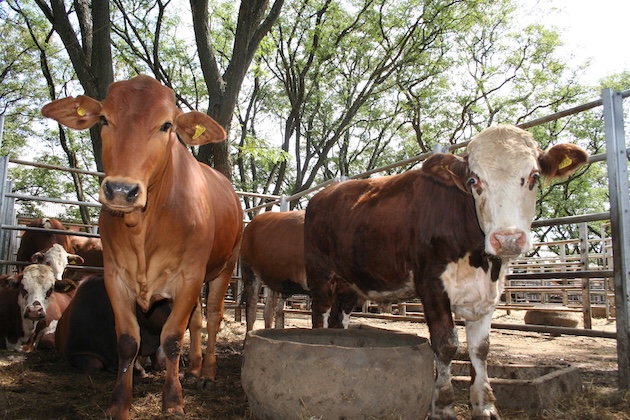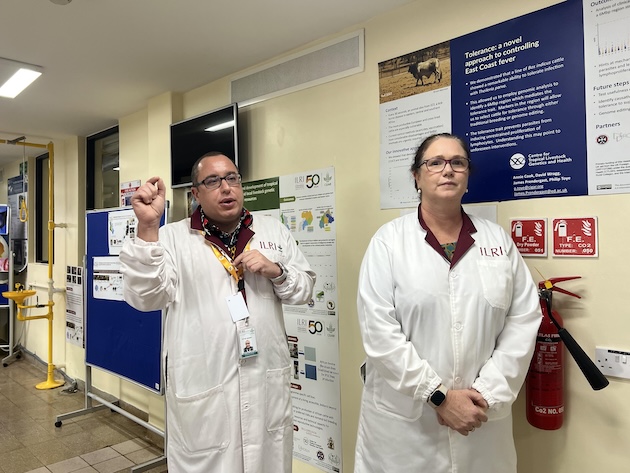NAIROBI, Apr 22 (IPS) – Livestock are a lifeline for millions of farmers in Africa as a source of food and wealth. But devastating diseases are threatening the health and productivity of their animals.
Now scientists at the International Livestock Research Institute (ILRI) have unleashed a toolbox of science solutions by outsmarting the parasites and pathogens that cost millions of dollars in livestock losses across Africa. The toolbox includes everything from vaccines that protect livestock from ‘cattle malaria’ to genetics to breed animals tolerant to East Coast fever.
East Coast fever is wiping out cattle herds across Africa, triggering income losses and food insecurity. Transmitted by ticks, East Coast fever (ECF) kills over a million cattle each year, with young calves especially at risk, says Dr. Nicholas Svitek, a microbiologist and senior scientist at ILRI’s Health Program and Centre for Tropical Livestock Genetics and Health (CTLGH).
Caused by a parasite called Theileria parva, ECF can be likened to the cattle version of malaria. It is caused by a parasite closely related to the one that affects humans, Plasmodium sp.
“ECF claims the lives of more than one million cattle every year—about one head of cattle every thirty seconds,” said Svitek, adding that the disease causes more than US$500 million in economic losses annually.
Science to the Rescue
Through a strategic partnership between the Roslin Institute, Scotland Rural College, and ILRI, CTLGH is developing genetic solutions to improve livestock-based livelihoods by studying the resistance of African indigenous cattle to ECF.
Svitek said scientists have identified a genetic marker, that is, a specific mutation in a gene called FAF1B associated with resistance to the ECF-causing parasite.
“We are currently studying the mechanism to confirm what the role of this gene is in the resistance to the disease,” said Svitek. “This study is quite a breakthrough not only to understand the biology of the parasite but, most importantly, how we can use this information for breeding programs to select animals that have this genetic marker so we can breed them, so by selecting these animals we can improve the health and overall productivity of the animals.”
ILRI has created experimental vaccines using artificial intelligence and genetically modified viruses to help cattle build immunity against the Theileria parva parasite.
The Institute has also developed experimental vaccines against the bacterial pathogen causing Contagious Caprine Pleuropneumonia (CCPP), Mycoplasma capricolum, a highly contagious respiratory disease in goats and the bacterial pathogen causing Contagious Bovine Pleuropneumonia (CBPP), Mycoplasma mycoides, which affects cattle.
Svitek and Dr. Hussein Abkallo, a molecular biology scientist, have been part of the groundbreaking use of the CRISPR-Cas technology to genetically engineer the African swine fever virus using weakened viruses as a vaccination strategy. CRISPR-Cas is the “genetic scissors” scientists use to edit DNA—the instruction manual inside every living cell—that causes disease.
Healthy Herds, Happy Farmers
ILRI’s science solutions will result in increased animal productivity due to better health and fewer deaths. Besides, scientists are now able to better screen cattle that are more resilient to common infections while reducing the reliance on costly antibiotics in treating sick animals.
Dr. Anna Lacasta, a senior scientist at ILRI focusing on animal health, said they are developing effective vaccines for developing countries. Dr. Svitek and his team have developed the first rapid test prototype using the CRISPR-Cas technology for diagnosing ECF in the field.

“ECF causes malaria but for cattle so it is a tricky disease to develop a vaccine for, as it is for malaria in people,” said Lacasta, who has led the vaccine development research on East Coast fever and African swine fever (ASF)—two important livestock diseases currently endemic in low- and middle-income countries.
ASF is a devastating disease affecting pig production in developing countries; current control methods, such as culling affected animals and using biosecurity in containing the disease, are inadequate.
ILRI has developed live attenuated vaccines (LAV) for ASF genotypes circulating in East Africa with promising results.
Research is ongoing on the Contagious Caprine Pleuropneumonia (CCPP), a severe, highly contagious mycoplasmal respiratory disease primarily affecting goats and sheep, as is the Contagious Bovine Pleuropneumonia (CBPP) in cattle.
“Diseases such as CCPP and CBPP are considered neglected because they affect animals in Africa. The diseases were eradicated in Europe, America, and Australia, but we still have the CCPP in Asia and CBPP in Africa,” said Dr. Elise Schieck, a senior scientist at ILRI, noting that the different vaccines were being evaluated for effectiveness.
Despite the development and use of various science solutions to tackling livestock diseases, there are limitations to their success. Access to vaccines and diagnostic tools is a challenge for farmers across Africa, especially where cold storage facilities are needed to keep the vaccines. Besides, limited extension and advisory services have also hindered farmers from taking up the innovations.
With the right partnerships and policies, science-led livestock health innovations can boost agricultural growth in Africa.
IPS UN Bureau Report
Follow @IPSNewsUNBureau
Follow IPS News UN Bureau on Instagram
© Inter Press Service (2025) — All Rights Reserved.




